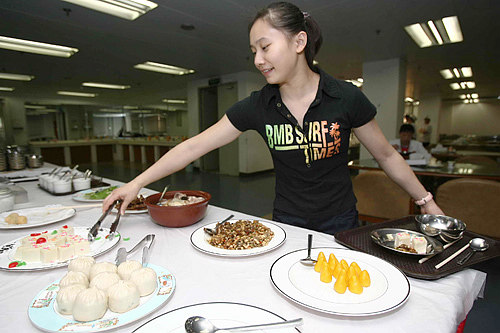|
 |
|
NUTRITIOUS FOOD: China's national athletes are provided with a scientific diet (CFP) |
Ahead of the 30th Olympic Games in London next year, China has been paying greater attention to the food of the athletes, making sure scientific and nutritious diets prepare them fully and keep them in condition.
This year, the first national Sports Nutrition Research and Testing Center (SNRTC) and the State Key Laboratory of Sports Nutrition (SKLSN) of the General Administration of Sport of China (GASC) were established as part of the Institute of Sports Medicine (ISM) of GASC. They both have the aim of promoting development of sports science as well as serving public health.
"The SNRTC is a state-level sports nutrition scientific research platform, which specializes in researching, analyzing and testing new nutrition recovery methods; assessing the effect of nutrients; and training and managing sports nutritionists," said Li Guoping, Director of the ISM.
The SKLSN boasts internationally advanced equipment and excellent services, said Jiang Zhixue, director of the science and education department of GASC.
"Only by scientifically combining sports activities with the correct nutrition can athletes improve their abilities and physical condition," said Cao Jianmin, Director of Sports Nutrition Office of the Science Research Center of Beijing Sport University. Cao has carried out many national-grade research projects on sports nutrition, playing an important role in advancing the research of the relationship between sports nutrition supplements and athletic ability.
Proper diet and scientific nutritional supplements provide athletes with substantial energy support for high-intensity athletic training and competitions.
"The long-term, high-intensity training of athletes may cause unavoidable decline in physical functioning or other medical problems. The right nutrition can help improve and retain the hemoglobin levels of athletes, boost and adjust their immune system, prevent and alleviate osteoarthritis and soft tissue injury as well as quicken injured tissue repairs," said Cao, who has recently participated in a research project on the relationship between excessive training and cardiovascular disease.
Proper diet also ensures athletes recover quickly after high-intensity training, Cao said. "It is dangerous for athletes if they cannot recover from fatigue quickly after training."
For example, Cao said, during the 2008 Olympic Games in Beijing, the diet of famous U.S. swimmer Michael Phelps attracted attention. He eats eight eggs for breakfast. The New York Post published his menus, which contained large quantities of carbohydrates and protein, and many nutritionists think it is appropriate.
"Carbohydrates are indispensable for athletes' training and to improve their performance. The human body mainly relies on carbohydrates to provide energy for muscle and brain and to maintain sports intensity during training and competitions," Cao said. The calories and nutrients the human body needs mostly come from carbohydrates, fat, protein and water. But the reserve of carbohydrates in the human body is very limited. If athletes do not get adequate carbohydrates, their muscles quickly become exhausted. Therefore, only if athletes obtain sufficient and balanced nutrients such as carbohydrates and protein, will they be able prolong their lives in sports.
There is a consensus in the field of sports nutrition that diets for athletes should contain at least two kinds of food rich in carbohydrates, Cao said. "There are many sources of carbohydrates in daily food, but high-quality, low-fat ones were better. Besides cereals and grains, potatoes are a good carbohydrate source."
In addition to carbohydrates, vitamin C and dietary fiber, potatoes are also rich in potassium. "Potassium is conducive to maintaining normal neurotransmission and preventing muscle spasms. For a long time, it has been held in high esteem in a sports diet and it is always on the food list of athletes before and during their competitions," Cao said.
He also stressed that the food of athletes is not much different from ordinary people's. The nutrition that athletes require is the same as other people, but they need a great deal more quantity. They must eat strictly according to the lists provided by their nutritionists and form strict dietary habits. | 